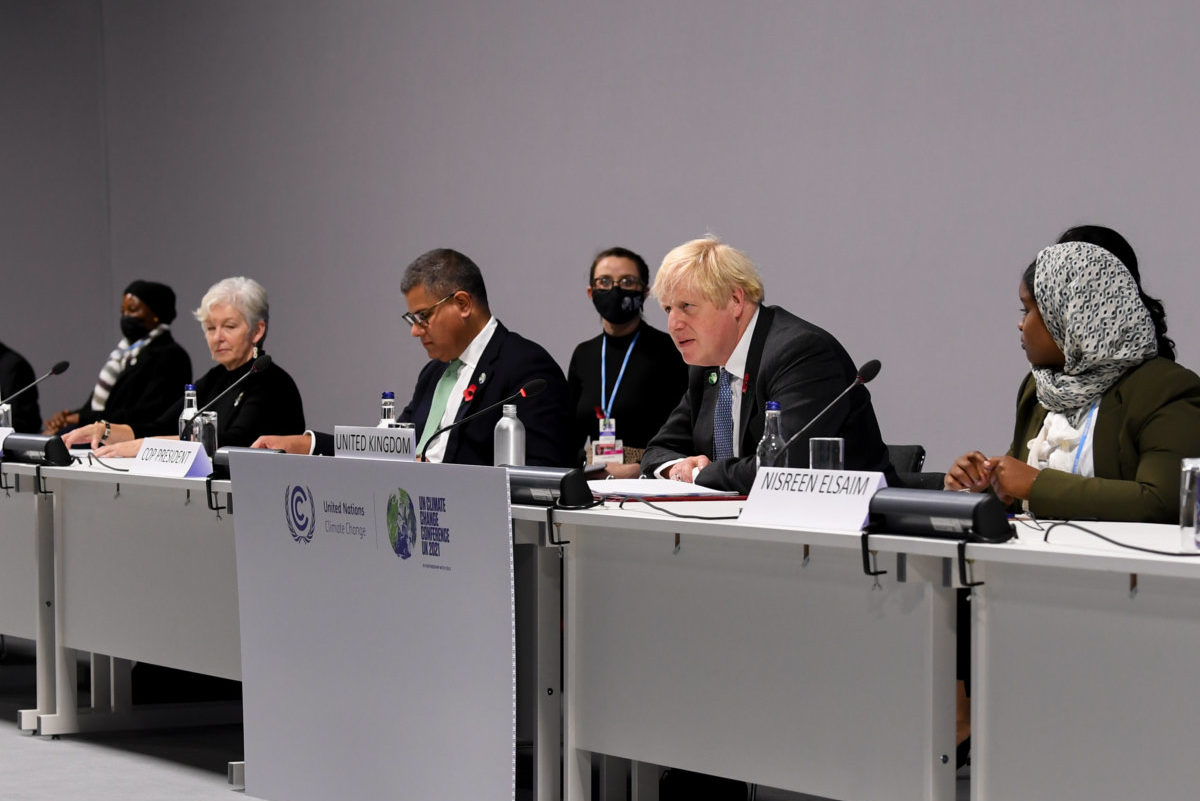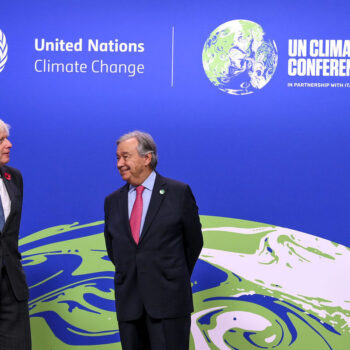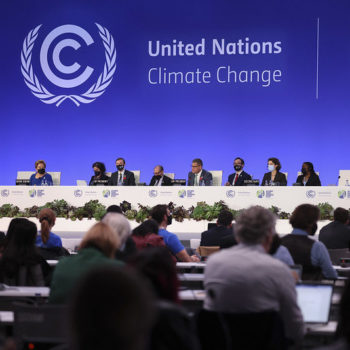COP26 requires the UK, not just other countries, to strengthen climate policies, Johnson and Sunak told. An unusual coalition of business, trade union and environmental leaders has written to Boris Johnson and Rishi Sunak calling on them to implement the Glasgow Climate Pact reached at COP26 last month.
Their letter comes at a key moment when the UK Government is still working out how to follow up the crucial UN climate talks, and the Climate Change Committee has warned that the Government’s climate policies are not sufficient to meet its targets.
The letter has been sent to the PM and Chancellor by Tony Danker, Director-General of the CBI; Frances O’Grady, General Secretary of the TUC; Colin Matthews and Peter Simpson, Co-Chairs of the UK Corporate Leaders Group; Tanya Steele, Chief Executive of WWF UK; Shaun Spiers, Executive Director of the Green Alliance; and Shane Tomlinson, acting head of the green think tank E3G.
The letter notes that the Glasgow Climate Pact calls on all countries to accelerate climate action and policy implementation. In addition, it calls on all countries to strengthen national emissions reduction targets by COP27 in November next year. Moreover, it reminds the PM and Chancellor that these instructions cannot just be for other countries. As the continuing COP Presidency for the next year, the UK government must lead by example and implement the Glasgow Climate Pact at home.
The letter, therefore, calls for a new cross-governmental initiative to review how current policies could be implemented more quickly and what new policies could accelerate action. This should be led by both the Prime Minister’s Office and by Alok Sharma, the UK COP26 President, it says. All government departments should be involved, with the Treasury and Foreign Office singled out as key participants.
Among policy areas the letter proposes for further policy development are:
- Waste and resource use policies which can accelerate the development of a ‘circular’ economy in which wastes are reused and recycled
- Nature conservation solutions which could accelerate decarbonisation and carbon sequestration in the agricultural sector
- An increase in public investment for climate action – beyond the funding announced in the Spending Review – to stimulate private sector investment and to support the aims of ‘levelling up’
- Clear regulation and incentives to encourage the finance sector to invest in decarbonisation
- Greater powers and funding to local and city authorities to enable them to accelerate implementation in areas such as planning, transport, retrofitting homes, improving skills and local job creation
- Support for the decarbonisation of industry, future-proofing jobs and establishing technological and competitive advantage
- Consumer incentives and support to help households decarbonise their homes and to make the net zero transition affordable
- Partnerships with businesses and trade unions in high carbon sectors to establish “just transition plans”. This gives businesses, workers and communities protection from potential adverse impacts of decarbonisation. Additionally, it supports a transition to greener business models and jobs
- International finance measures to support the least developed countries in gaining access to increased funding and investment for climate action, particularly for adaptation to climate change
- Plans to close the ‘adaptation gap’ in the UK identified by the Climate Change Committee.
Quotes
Tony Danker, Director-General of the CBI, said:
“The UK Presidency played a crucial role in securing progress at COP26 through the Glasgow Climate Pact. But that was the starting pistol, not the finish line. The UK government must build on this momentum, focusing on accelerated action and implementation of our ambitious domestic climate goals. This will require alignment of all government departments and unprecedented collaboration with businesses, who are ready with the investment and innovation to make commitments a reality.”
Frances O’Grady, General Secretary of the TUC, said:
“Our call for a significant increase in public investment in green tech and industry will safeguard jobs in Britain’s industrial heartlands. Additionally, it will help create good quality new jobs across the UK too. It’s where the levelling up agenda and our net zero targets meet – an opportunity to put Britain on a path to greater regional equality and prosperity for working people.”
Colin Matthews, Chairman of EDF in the UK and Co-Chair of the UK Corporate Leaders Group, said:
“UK business is behind Net Zero. Private sector investment is accelerating the UK’s transition away from fossil fuels and is developing new low carbon technologies to decarbonise the rest of the economy. Government can grow business confidence for long term investment in Net Zero by aligning its plans with the ambitious Glasgow Climate Pact, and clarifying future policy direction and targets for firms as soon as possible.”
Peter Simpson, Chief Executive of Anglian Water and Co-Chair of the UK Corporate Leaders Group, said:
“Urgent action is required to build on the success of the Glasgow Climate Pact. At COP26 businesses demonstrated what they are already doing to deliver net zero. We can do even more, together, by challenging existing policy against the ambitions set out in the Glasgow Pact.”
Tanya Steele, Chief Executive of WWF UK, said:
“Without urgent action to reverse nature loss and slash emissions from polluting fossil fuels, we risk climate catastrophe. The UK continues to hold the COP Presidency and the UK Government has a responsibility to show international leadership by keeping its climate and nature 3 promises. Adopting a net zero test for UK government spending, setting out a decarbonisation strategy to put agriculture and land use on a sustainable footing, and strengthening measures to eliminate deforestation from UK supply chains are all vital steps the UK Government must now take, to ensure it delivers on its all-important climate and nature goals.”
Shaun Spiers, Executive Director of the Green Alliance, said:
“COP26 moved the dial, but we can’t afford to just pat ourselves on the back and say job done. The Glasgow summit was just the start of our hosting responsibilities. The government must now put in place a clear, funded plan to deliver on its commitments, and give Alok Sharma the tools to drive action in the run-up to COP27.”
Shane Tomlinson, Acting Chief Executive of E3G, said:
“As COP President the UK will remain at the centre of global climate diplomacy until COP27 in Egypt next year. Implementing the Glasgow Climate Pact will depend on the UK’s credibility on the world stage, which requires us to deliver on our promises at home.”
Read the letter in full here.
Notes for editors
A copy of the letter is above.
For further information, contact:
Pascale Palmer, Senior Media Advisor
Corporate Leaders Group
University of Cambridge Institute for Sustainability Leadership
Mobile and WhatsApp: +44 (0)7432 533 080
Michael Jacobs
Mobile and WhatsApp: 07795 333473


